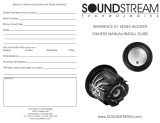Page is loading ...

ENCLOSURE RECOMMENDATIONS
Crossfire Tech Support Contact Information
Phone: (562) 906-0800
E-mail: [email protected]
[email protected] (asistencia en español)
Note: Dimensions for recommended enclosure are with considerations of using .75" (19mm) MDF board. Be
sure to add .075ft3/2.123L for driver displacement as well as the volume of the port to all enclosures, except
for the optimum recommendation as those dimensions already include woofer displacement but DO NOT
include port displacement.
POWER RATINGS
Rating the power handling of subwoofers is not a difficult task. However, understanding power ratings is
often confusing. Many times the Maximum Power Ratings are viewed as the RMS power handling of the
driver, when in actuality Maximum is generally the break point of the driver. This has lead Crossfire to come
up with a system of rating the power necessary to drive our subwoofers. Please read the following carefully
before choosing your amplifier or with consideration of the power you may already have.
Nominal power handling
Nominal power handling is the power rating given by Crossfire at which the subwoofer will experience
minimal mechanical degradation over time when using a recommended enclosure. In other words, this is the
recommended power to be used per woofer to assure long life.
Maximum power handling (PE)
Maximum power handling is the power rating given by Crossfire at which the subwoofer could experience a
high amount of mechanical degradation that may lead to possible failure over time when using a
recommended enclosure. In other words, do not exceed this power level for extended periods of time.
Dynamic power handling
Dynamic power handling is the power rating given by Crossfire for peak transients and short bursts.
Continuous playing at or above this level will cause mechanical failure and/or thermal failure. In other
words, this power level should never be attained with the exceptions of approved SPL competition vehicles.
This could possibly void your warranty.
F.I.T. PLUG INFORMATION
Secondary Indicator
Please contact Crossfire Tech Support for bandpass enclosure recommendations
Cu. feet/Cu. liters “Q” -3dB Max Power Handling (PE)
small sealed volume: 1.6/45.3
1.4 34Hz 500 watts
large sealed volume: 2.6/73.6
1.18 29Hz 600 watts
Cu. feet/Cu. liters Tune to Port -3dB PE
small vented volume: 2.2/62.3 36Hz 4” X 8.75” 34Hz 600 watts
large vented volume: 4/113.3 29Hz 4” x 7” 25Hz 600 watts
SPECIFICATIONS @ 8ohm
Cutout diameter, in/mm 13.75/349
Dynamic power handling 1400 watts
Magnet weight 85oz.
Frequency response 20-250Hz
Qms
6.34
Driver description 15” Subwoofer
Mounting depth, in/mm 7.5/191
Woofer Outer Diameter, in/mm 15.375/391
Woofer Displacement, ft3/ltr .15/4.427
Impedance 2 or 8 ohm
Nominal power handling (RMS) 375 watts
Maximum power handling (PE) 750 watts
Voice coil – size 2.5”, 4 layer
Resonance frequency (fs) 23.5Hz
Qts .69
Qes .77
VAS, ft./liter 5.3/149.8
X-max, in./mm .562/14
Re (actual resistive load)
Efficiency (2.83V/1M)
6.6
85.8db
Model
BMF1528
Optimum Sealed Volume
Internal volume: 2.15 cu.ft./60.9L
Enclosure "Q": 1.3
-3dB response: 32Hz
Maximum power handling: 600 watts
12.5" 16.25"
17.5"
The above dimensions already include woofer
displacement compensation.
Internal volume: 3.15 cu.ft./89.2L
Tuning frequency: 30Hz
Port (D x L): 4" X 9.5"
-3dB response: 27Hz
Maximum power handling: 600 watts
Optimum Vented Volume
20"
17.5"
20"
The above dimensions already include woofer
displacement compensation, but DO NOT
include port displacement so you must figure
this factor in prior to building this particular
enclosure.
Crossfire's Flexible Impedance Technology or F.I.T. plug was designed to allow you to change the impedance of
your subwoofer by simply removing the jumper box and rotating it 180 degrees to the desired load position. This
technology was designed to eliminate the use of external jumper wires associated with dual voice coil subwoofers
and since it is NOT a good idea to use only one coil of a subwoofer we have devised this method to eliminate that
problem as well. The hard work is already done so all you need to do is select the impedance that will fit your
install needs, connect the speaker cable to the terminal located at the opposite side of the subwoofer and you're
ready to rock and roll "LITERALLY".
Start by placing the subwoofer upside down on a clean and smooth surface. Remove the F.I.T. plug and rotate it
so the proper impedance number is facing up (please see illustration below). Insert the jumper box and install the
subwoofer in it's enclosure for your listening pleasures.
NOTE: In the event the impedance indicators are lost from the plug you may refer to a very small triangular
impression located at the top left corner on one side of the plug. Please note that this impression is very small
and hard to see so please look carefully. Once you have acknowledged the position of this secondary indicator you
can reference this side to be lowest possible impedance of the subwoofer. For example, on a BMF1014 subwoofer,
with the triangular indicated side of the plug facing upward this will be the 1ohm load setting of the subwoofer,
thus rotating it 180 degrees making it a 4ohm load. If you have questions or doughs please call our Technical
Support Team at Crossfire.
/


